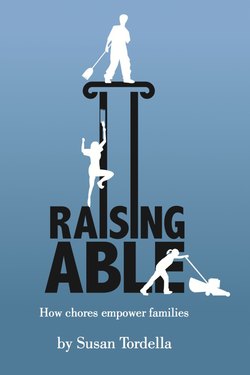Читать книгу Raising Able - Susan Tordella - Страница 6
На сайте Литреса книга снята с продажи.
Research affirms the power of chores
ОглавлениеDr. Marty Rossmann of the University of Minnesota evaluated data from a longitudinal study on parenting styles collected by Diana Baumrind in the San Francisco Bay area starting in 1967. “Longitudinal” means that the children were followed for a long period of time. The study began with more than 400 children and ended with 85 young people in their mid-20s participating.
In the 1990s, Dr. Rossmann looked at Baumrind’s data and determined that the young adults who had done household chores when they were 3 and 4 years old were more successful in their mid-20s than their counterparts who did no chores as preschoolers, or who did not start doing chores until they were 15 or 16 years old. Waiting until the youngsters were in their teens to start chores backfired, and those subjects were also less successful in their mid-20s. Teaching responsibility through chores is best accomplished early in life, according to Dr. Rossmann’s research.
How chores are presented to the children was cited as a factor in becoming well-adjusted independent adults, Dr. Rossmann said. She suggested using a family meeting, a chore chart, and not paying children for chores. These suggestions align with my recommendations.
In research and practice, chores benefit children and families. The earlier in life children start contributing to the common good, the better it is for their development of responsibility, self-discipline, a work ethic, developing skills and connecting to the family through chores and family meetings.
Dr. Rossmann is now retired. When interviewed by phone, she regretted never reporting the chores research in a published article before retiring from the University of Minnesota. Information on her findings is available at http://www.cehd.umn.edu/research/highlights/Rossmann/.
